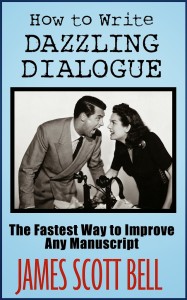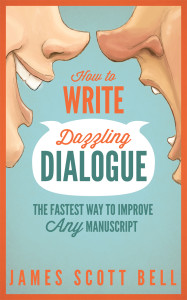Over the years, after looking at countless manuscripts at writers’ conferences, I’ve come to the conclusion that there is one thing that can sink or elevate a manuscript right from the jump.
That thing is dialogue.
If it is flat, sodden, unremarkable and (worst of all) sounds the same when coming out of different characters, there’s a letdown. Readers may not analyze it that way, but will feel it subconsciously. The dialogue becomes one of those “speed bumps” that lessens reading pleasure.
You know who really notices? Agents and editors. To save time, most of them will turn immediately to the first chapter of a proposal, to see if the writer can write. Dialogue is one way they can tell.
If your dialogue is crisp, filled with tension, and unique to the characters, the industry pro immediately gains confidence in your ability as a writer.
Which kind of makes dialogue important, don’t you think?
And that’s why I’ve written this book:
It is available as an ebook for $2.99 at:
For those of you who like writing books in print (so you can highlight physical pages) I’m working on that version now.
In this book I’ve tried to pull together everything I’ve learned and taught about writing dialogue. The nice thing is that the techniques do not have to be housed in the blubber of irrelevant text, war stories, rants, and veiled self-promotion. I’ve always preferred reading––and teaching––nuts and bolts, techniques that can be easily understood and immediately put to work.
We start out with a definition of dialogue. I like what the noted playwright and screenwriter John Howard Lawson said: “Dialogue is a compression and extension of action.”
Knowing just that much will go a long way toward making sure you don’t write irrelevant talk.
The book covers the essentials of dialogue, like tension and story weaving. There are abundant tools you can utilize right away, like the voice journal and the parent/adult/child method for instant conflict.
And something I haven’t seen anywhere else. I’ve put in a section on all the punctuation rules for dialogue in fiction. This can be used as a simple reference guide when you’re unsure how to render dialogue in your manuscript. Like, does the punctuation always go inside the quote mark? (Yes). Is there always punctuation? (Yes). What about semi-colons in dialogue? (Maybe you can guess what I have to say about that!)
And I’ve included some great examples from novels and film. Like this nugget from Charles Webb’s novel The Graduate (basis for the classic Dustin Hoffman movie). Here young Benjamin Braddock is at the hotel desk, getting a room to begin his affair with Mrs. Robinson. He is quite sure that everyone in the hotel will find out what he’s up to. Notice how much inner tension is rendered by the dialogue alone.
“Yes sir?” the clerk said.
“A room. I’d like a room, please.”
“A single room or a double room,” the clerk said.
“A single,” Benjamin said. “Just for myself, please.”
The clerk pushed the large book across the counter at him. “Will you sign the register, please?” There was a pen on the counter beside the book. Benjamin picked it up and quickly wrote down his name. Then he stopped and continued to stare at the name he had written as the clerk slowly pulled the register back to his side.
“Is anything wrong, sir?”
“What? No. Nothing.”
“Very good, sir,” the clerk said. “We have a single room on the fifth floor. Twelve dollars. Would that be suitable?”
“Yes,” Benjamin said, nodding. “That would be suitable.” He reached for his wallet.
“You can pay when you check out, sir.”
“Oh,” Benjamin said. “Right. Excuse me.”
The clerk’s hand went under the counter and brought up a key. “Do you have any luggage?” he said.
“What?”
“Do you have any luggage?”
“Luggage?” Benjamin said. “Yes. Yes I do.”
“Where is it?”
“What?”
“Where is your luggage?”
“Well it’s in the car,” Benjamin said. He pointed across the lobby. “It’s out there in the car.”
“Very good, sir,” the clerk said. He held the key up in the air and looked around the lobby. “I’ll have a porter bring it in.”
“Oh no,” Benjamin said.
“Sir?”
“I mean I—I’d rather not go to the trouble of bringing it all in. I just have a toothbrush. I can get it myself. If that’s all right.”
“Of course.”
Benjamin reached for the key.
“I’ll have a porter show you the room.”
“Oh,” Benjamin said, withdrawing his hand. “Well actually I’d just as soon find it myself. I just have the toothbrush to carry up and I think I can handle it myself.”
“Whatever you say, sir.”
To which I can only say, “Go thou and do likewise.” And I hope my book will help you along the way.
Speaking of dialogue in your own fiction, what do you have to say? Who writes some of your favorite dialogue?


